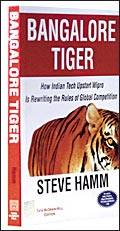 |
BANGALORE TIGER
By Steve Hamm
Tata McGraw-Hill
Pp: 329
Price: Rs 299 |
Although
the success of the Indian IT industry has been well chronicled,
there is little by way of in-depth case studies on individual
companies. For instance, while everybody knows how seven friends
came together to launch Infosys, few outsiders know of the exact
dynamics between them or how the seed capital of Rs 10,000 was
actually raised (there are many conflicting versions available).
So Bangalore Tiger, even with its rather lengthy and pompous subtitle
of 'How Indian Tech Upstart Wipro is Rewriting the Rules of Global
Competition', is a welcome addition. Written by Steve Hamm, a
Senior Writer with American magazine BusinessWeek, the book is,
however, one disappointing read. But why did Hamm decide to use
Wipro as a proxy for the Indian it industry? After all, TCS is
larger and Infosys more profitable. In his defense, the author
says that Infosys did not cooperate and TCS has interests in McGraw-Hill,
the book's publisher. So Wipro it had to be.
No problem. Wipro is without doubt an interesting
company and has a compelling story to share, as this reviewer
can attest, having covered the company for nearly a decade. The
soaps-to-software giant and, even more so, its media-shy Chairman
Azim Hasham Premji make rich material for a good book. Hamm, however,
fails to provide even a single new insight into either the workings
of the company or what drives Premji. Besides stating well-known
facts such as how a young Premji had to abruptly return home from
Stanford after his father's untimely demise, Hamm does not provide
any original anecdotes. Although written like a reporter's story,
the book has several blind spots, making it look like a project
commissioned by the company's pr department. There are no comparisons
of Wipro's strengths (and weaknesses) with those of its competitors.
While Hamm goes on and on about Premji's aversion to company politics
(largely true), he does not ask why is it that anyone seen as
a #2 to Premji doesn't last long enough.
Some ex-Wiproites such as Sridhar Mitta,
Subroto Bagchi, Vivek Paul and Ashok Soota make cameo appearances
in the book, but there has been no effort to get insights of people
like P.S. Pai, Arun Thiagarajan, D.A. Prasanna (all former Vice
Chairmen) or from the Wipro alumni. Even some of Wipro's mis-steps,
like its failure in finance business through Wipro Finance, barely
find a mention. Similarly, the successes the company has had in
areas like outsourced R&D and chip design haven't been drawn
out well enough. For somebody looking to get a general idea of
Wipro, Bangalore Tiger is a passable, but difficult, read. For
those who have been following Wipro and the Indian tech sector,
it is a big disappointment.

|
THE PERFECT THING
By Steven Levy
Simon & Schuster
Pp: 284
Price: Rs 905 |
No
other product has met with such resounding success as has Apple's
iPod. By the end of 2006, Apple had sold nearly 68 million units
of some version or other of its sleek, small and sexy little MP3
player. Its runaway success ever since it was launched in 2001
took even Apple by surprise-no one expected iPod sales (and sales
of songs off iTunes, the iPod's complementary online store) to
account for nearly 60 per cent of Apple's revenues.
Steven Levy, a senior editor at Newsweek
and its chief technology correspondent, a longtime Apple tracker,
is a self-confessed iPod-head and The Perfect Thing is a definitive
book on the white (also black and now red!) gadget that has changed
forever the way people listen to and store music. Levy traces
the heady journey of how the iPod became an instant hit soon after
its low-key launch just weeks after the 9/11 attacks. His book,
formatted in iPod's trademark 'shuffle' style (you can read the
11 chapters in any sequence), takes you not only behind the scenes
at Apple but also gives you a peek at the cultural phenomenon
its wonder gizmo has become. "The iPod," writes Levy,
is a pebble with tsunami-sized cultural ripples." A gush
but one that's backed by reason.
|






